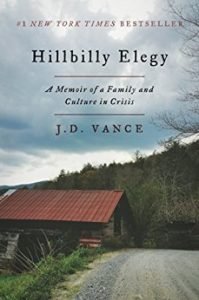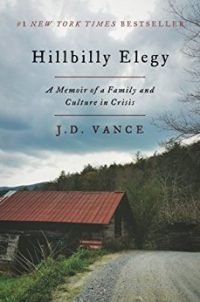
Synopsis
J.D. Vance is the grandchild of hillbillies from Kentucky who emigrated to Ohio with the promise of good jobs in a steel mill. He was raised by a single mother with addictions and a string of failed relationships. A feisty grandmother kept J.D. from being a statistic of working class white families throughout our country. Instead of ending up in a cycle of poverty, addiction, and abusive relationships, J.D. is a success story. He deferred a college education to enlist in the Marine Corps and graduated from Ohio State in 2.5 years while working sometimes three jobs. He entered the Ivy League as a Yale law student. Now equipped with a good job and happily married to a Yale law classmate, J.D. is an inspiration and mentor to future generations of at risk youth. Hillbilly Elegy is his story.
Pros:
- No matter where you stand politically, you need to read Hillbilly Elegy.
- The story is inspiring and eye-opening to the plight of the white working class. While this demographic takes heat as receiving “white privilege”, they do not share many of its advantages.
- Hillbilly Elegy is a frank and often raw portrayal of what it’s like to grow up poor and white in Midwestern America.
- J.D. offers a perspective that rises above political talking points. He is an admitted conservative. But the book offers both praise and criticism to all sides of the issues of poverty, opportunity, and how to give all Americans the opportunity to succeed. As a result, it’s never a diatribe against the other side or propaganda for his side of the argument.
Cons:
- Not exactly a “con” as much as a disclaimer. Hillbilly Elegy is a New Adult book. The subject matter is not appropriate for younger audiences. Not only because of the raw language/innuendo (see other con) but because the subject matter is best for older teens and adults with good critical thinking skills. This is a book that screams for self-assessment/discussion afterwards. Consequently, it’s not light reading.
- There is a lot of rough language including numerous F-bombs. The language is never gratuitous except maybe a chapter later in the book. The author coaches himself through a social situation with “elites” by telling himself several times to not be an “A******”. I listened to the author read the book. The language may not be as jarring in print. But there is enough that I gave the book 4 stars instead of 5.
-
Really, the language was the only negative
Recommended Audience:
In conclusion, I would recommend Hillbilly Elegy to adults and mature teens. This is not a book to read for entertainment’s sake, but one to offer insight into the problems plaguing the working class in America. Most of all, there’s a hopelessness and desperation in this community as well as broken families, addiction, a cycle of poverty, and waning opportunities.
Final Word:
This was a deeply personal book for me. I went through most of my life oblivious to those suffering around me. As a result, It’s not often a book sucker punches me with such self-awareness.
The first day of my professional life began in J.D.’s hometown (Middletown, OH). My trainer described himself as “a Tennessee Ridge Runner” (i.e. hillbilly from Tennessee). I reflected on that time. Did J.D. walk by me? A faceless tween in the public library. At the time, I didn’t care about students in a crumbling steel town. My goal to learn what I needed and move onward and upward in the company.
Before then, I was raised in a city not too different from Middletown, OH, I was a middle class kid surrounded by working class peers. I think back to my school days and wonder which of my classmates grew up like J.D. I’m sure some went to bed hungry. Some likely hid from abusive parents. Or played grownup because their parents were addicts or absent. As a student, I was long on ambition and low on empathy.
As an adult, I’m can see how privileged we are and try to pass that insight onto my children. I want to help those in my community who I think might have it a bit harder than the rest. After reading this, I’m even more inspired to look for ways to mentor the J.D.s of this generation.
-
Do you believe in “white privilege”?
- What are obstacles poor white people have in common with minorities in a similar situation?
- Think about a child in J.D.’s situation and brainstorm ways you could help a child like him.
-
How do you think as a country we can help improve the lives of the working class?

